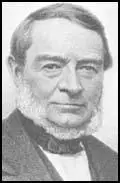Samuel May

Samuel May was born on 12th September, 1797. He became a Unitarian clergyman and was a pastor of churches in Brooklyn, Connecticut (1836-42) and at South Scituate, Massachusetts (1845-1867).
May was a social reformer and secretary of the Massachusetts Anti-Slavery Society. He also supported women's suffrage. In 1846 he argued: "But some would eagerly ask, should women be allowed to take part in the constructing and administering of our civil institutions? Allowed, do you say? The very form of the question is an assumption of the right to do them the wrong that has been done them. Allowed! Why, pray tell me, is it from us their rights have been received? Have we the authority to accord to them just such prerogatives as we see fit and withhold the rest? No! woman is not the creature, the dependent of man but of God. We may with no more propriety assume to govern women than they might assume to govern us. And never will the nations of the earth be well-governed until both sexes, as well as all parties, are fairly represented and have an influence, a voice, and, if they wish, a hand in the enactment and administration of the laws."
Samuel May died on 1st July, 1871.
Primary Sources
(1) Samuel May, The Rights and Condition of Women (1846)
To prove, however, that woman was not intended to be the equal of man, the argument most frequently alleged is that she is the weaker vessel, inferior in stature, and has much less physical strength. This physiological fact, of course, cannot be denied; although the disparity in these respects is very much increased by neglect or mismanagement. But allowing women generally to have less bodily power, why should this consign them to mental, moral, or social dependence? Physical force is of special value only in a savage or barbarous community. It is the avowed intention and tendency of Christianity to give the ascendancy to man's moral nature; and the promises of God, with whom is all strength and wisdom, are to the upright, the pure, the good, not to the strong, the valiant, or the crafty.
The more men receive of the lessons of Christianity, the more they learn to trust in God, in the might of the right and true, the less reliance will they put upon brute force. And as brute force declines in public estimation, the more will the feminine qualities of the human race rise in general regard and confidence, until the meek shall be seen to be better than the mighty, and the humble only be considered worthy of exaltation. Civilization implies the subordination of the physical in man to the mental and moral; and the progress of the melioration of the condition of our race has been everywhere marked by the elevation of the female sex.
But some would eagerly ask, should women be allowed to take part in the constructing and administering of our civil institutions? Allowed, do you say? The very form of the question is an assumption of the right to do them the wrong that has been done them. Allowed! Why, pray tell me, is it from us their rights have been received? Have we the authority to accord to them just such prerogatives as we see fit and withhold the rest? No! woman is not the creature, the dependent of man but of God. We may with no more propriety assume to govern women than they might assume to govern us. And never will the nations of the earth be well-governed until both sexes, as well as all parties, are fairly represented and have an influence, a voice, and, if they wish, a hand in the enactment and administration of the laws.
One would think the sad mismanagement of the affairs of our own country should, in all modesty, lead us men to doubt our own capacity for the task of governing a nation, or even a state, alone; and to apprehend that we need other qualities in our public councils, qualities that may be found in the female portion of our race. If woman be the complement of man, we may surely venture the intimation that all our social transactions will be incomplete, or otherwise imperfect, unless they have been guided alike by the wisdom of each sex. The wise, virtuous, gentle mothers of a state or nation (should their joint influence be allowed) might contribute as much to the good order, the peace, the thrift of the body politic as they severally do to the well-being of their families, which for the most part, all know is more than the fathers do.
